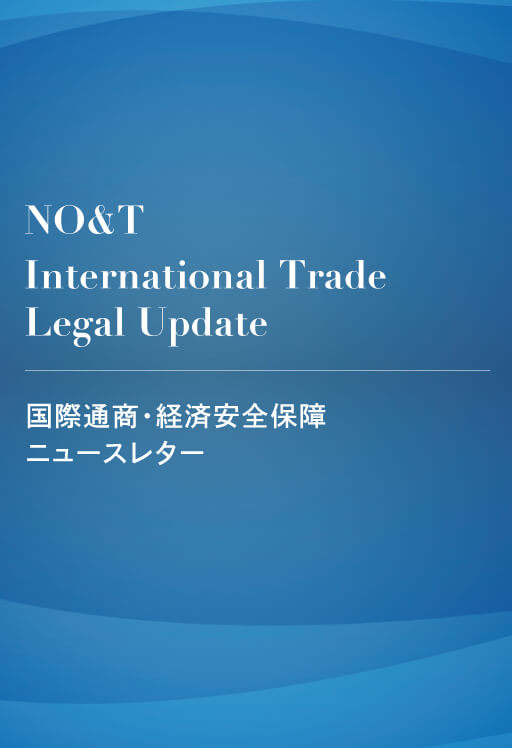
NO&T International Trade Legal Update
NO&T Compliance Legal Update
This article is also available in Japanese.
In April 2024, the Subcommittee on Security Export Control Policy under the Trade Committee of the Industrial Structure Council※1 (“Subcommittee”) released an interim report (“Interim Report”). The Interim Report, which followed the clarification of Deemed Export Controls in May 2022 and the tightening of export regulations on advanced semiconductor manufacturing equipment in May 2023, synthesized discussions on export control issues arising from changes in the security environment since the prior June 2021 interim report.
The Interim Report outlines recommendations on future policy directions to address the challenges of security export control system faced by the international community and Japan, and reports on discussions regarding medium-to-long-term policy making issues that should be considered, including the implementation of new forms of export control, in response to the significant changes currently underway in the international security trade environment, such as the re-emergence of some state actors of security concerns, the growing importance of dual-use technologies, and the rise of countries with strong technological expertise that do not participate in multilateral export control regimes.
In this newsletter, we explain the proposed policy recommendations in the Interim Report which are expected to have a significant impact on the private sector if legislated. The newsletter is structured as follows: (i) amendment to the catch-all control (Section 2), (ii) discussion on the establishment of a new dialogue framework for technology transfer between public and private sectors (Section 3), and (iii) discussion on the streamlining and prioritizing of export control systems and operations in accordance with the levels of security concerns (Section 4).
Under the Foreign Exchange and Foreign Trade Act (“FEFTA“), Japan enforces two types of export control: list control and catch-all control. Both require an exporter to obtain a license from METI before exporting or transferring (a) listed items※2 (List Control), and/or (b) non-listed items that could potentially be used for the development, manufacture, or use (collectively “development, etc.”) of weapons of mass destruction (“WMD”) or conventional weapons (Catch-all Control).
The catch-all control requires exporters to obtain the license to export WMD and conventional weapons in certain situations. Exports to so-called Group A countries※3 are not subject to the catch-all control by all means, whether related to WMD or conventional weapons.
◆ Current catch-all control on WMD
| Destinations | License requirements | ||
|---|---|---|---|
| Informed condition | Objective condition | ||
| End-use | End-user | ||
|
All countries except for Group A countries |
○ | ○ | ○ |
◆ Current catch-all control on conventional weapons
| Destinations | License requirements | ||
|---|---|---|---|
| Informed condition | Objective condition | ||
| End-use | End-user | ||
| UN arms embargo countries | ○ | ○ | ― |
| General Countries | ○ | ― | ― |
Created based on information on METI’s homepage※5
Under the current catch-all control, as shown in the chart above, exports related to conventional weapons to General Countries do not need a license unless METI orders so (i.e. the informed condition is met). However, the Interim Report notes that as other countries and regions such as the United States and European Union have been tightening export controls related to conventional weapons in recent years by focusing on end-use and end-users and requiring licenses for exports to General Countries with additional conditions beyond the informed condition, Japan should also engage in and align with such international cooperation efforts.
The Interim Report proposes that exports or transactions to General Countries where exporters identify the exported items have high security risk and are likely to be used for the development, etc. of conventional weapons should also be subject to the objective condition. The Interim Report further suggests the scope of such transactions of concern that is subject to regulation should be determined based on the (i) items to be exported, (ii) end users, and (iii) terms and conditions and circumstances of the transaction. It also highlights the importance of considering (iv) Japan’s relationship with the destination countries to avoid excessive regulation, especially in the context of supply chain cooperation with allies and friendly countries※6. The Interim Report proposed the following recommendations for identifying high-risk transactions:
| (i) |
Identify target items by limiting them to:
|
|---|---|
| (ii) |
Provide information on end-users of concern:
|
| (iii) |
Provide criteria for transactions of concern (“Red Flags”):
|
| (iv) |
Rationalize export control procedures based on the relationship with destination countries:
|
Under the FEFTA, exports to Group A countries are currently not subject to catch-all control at all for both WMD and conventional weapons (i.e. neither the informed condition nor the objective condition is applicable), as export control regulations in these countries are considered appropriate. However, the Interim Report noted that concerns of circumvention via Group A countries have arisen due to increasingly complex and sophisticated procurement activities by the countries of concern.
The Interim Report therefore suggests that the Japanese government implement closer enforcement cooperation with export control authorities of Group A countries, such as sharing information of concern, and requiring exports to Group A countries to be also subject to the informed condition so that METI can inform exporters and require a license based on the shared information of concern※7.
The Interim Report notes that the fierce competition for technological superiority increases the risk for technology leakage. Especially with the blurry distinction between military and civilian technologies in recent years, there is a higher concern that technologies initially intended for civilian use at the time of the transactions may be diverted into military use over time in terms of their users and uses.
In response to the growing risk of technology leakage and diversion to military use, the Interim Report proposes strengthening the current transaction review system for those transactions that may fall under neither the list control nor the catch-all control. Meanwhile, the Interim Report also suggests reasonably narrowing down the scope of such transactions to be regulated to only those with a high risk of technology leakage, by filtering them through both technology type and transaction type. For the technology type transactions to be regulated, factors such as versatility, ease of acquisition by other countries, potential for independent development, and Japan’s superiority and indispensability shall be considered. For the transaction type transactions to be regulated, the risk of technology leakage and impact on business activities shall be taken into account.
When identifying transactions with a high risk of technology leakage and military use, the Interim Report further recommends introducing a new dialogue framework on technology transfer between the public and private sectors through a step-by-step approach rather than imposing the license obligation directly※8. Under this dialogue framework, METI will (i) require a report from exporters prior to the commencement of the relevant transactions, (ii) engage in dialogue and consultation with the exporters including sharing information of concern and providing advice, and (iii) inform and request the application of the license only if the concerns are not resolved.
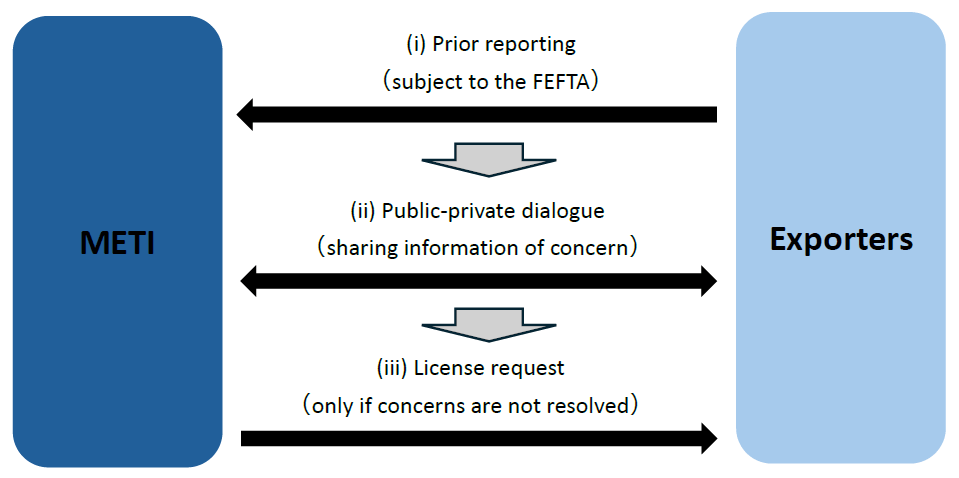
Created based on Chart 4 of the Interim Report
Regarding the implementation of (i) prior reporting, the Interim Report points out that it should be combined with and obliged pursuant to the current FEFTA such as Article 55-8 (Other Reporting), so that if the prior reporting obligation is imposed as proposed in the Interim Report, the exporter will manage their transactions relating to technology transfer during their daily business in a more careful manner, and report to and consult with METI as necessary prior to such transactions in order to avoid potential consequences for violations of the FEFTA.
Regarding the time of the prior report, the Interim Report suggests that it should be prior to the execution of the transaction agreements so that the exporter will not breach the transaction agreement if it needs to cease the technology transfer after consultation with METI. Additionally, the Interim Report specifically notes that even in the phase of agreement negotiation, METI should support the exporter to obtain a good understanding of the counterparty to the transaction and request the exporter to obtain a license under the informed condition if necessary, when METI considers the technology transfer should be ceased.
The Interim Report also emphasizes the need for a more efficient export control system and points out that rationalization of procedures is possible in the following areas※9.
The policy recommendations proposed in the Interim Report, if legislated, are expected to have a considerable impact on the practice of exporting goods and technologies in Japan. Given that the current export control system under the FEFTA might not adequately address policy needs such as the prior reporting system for technology transfer and effective screening of exports to General Countries of high-risk items potentially used for the development, etc. of conventional weapons, it is necessary to consider changes and reforms to the export control system.
At present, the specific scope of these proposed regulations has not been clarified, but there are reports that revisions to current regulations will proceed as early as this summer. We recommend companies engaging in the export of goods and technologies to pay close attention to future policy-making trends, assess the impact of these proposed regulations on their business operation or transaction timeline, and take necessary measures and response in a timely manner.
*1
Established within the Ministry of Economy, Trade and Industry (“METI”).
*2
Sensitive goods and technologies with a high potential for military use, specified in Items 1 to 15 of Attachment List No.1 to the Export Trade Control Order and Items 1 to 15 of the Attachment List to the Foreign Exchange Order.
*3
Argentina, Australia, Austria, Belgium, Bulgaria, Canada, Czech Republic, Denmark, Finland, France, Germany, Greece, Hungary, Ireland, Italy, South Korea, Luxembourg, Netherlands, New Zealand, Norway, Poland, Portugal, Spain, Sweden, Switzerland, United Kingdom, United States.
*4
Afghanistan, Central African Republic, Democratic Republic of the Congo, Iraq, Lebanon, Libya, North Korea, Somalia, South Sudan, Sudan.
*6
The Interim Report P.6-8.
*7
The Interim Report P.8.
*8
The Interim Report P.10.
*9
The Interim Report P.13-15.
This newsletter is given as general information for reference purposes only and therefore does not constitute our firm’s legal advice. Any opinion stated in this newsletter is a personal view of the author(s) and not our firm’s official view. For any specific matter or legal issue, please do not rely on this newsletter but make sure to consult a legal adviser. We would be delighted to answer your questions, if any.


Ngoc Hoang


(February 2025)
Oki Osawa (Comments)
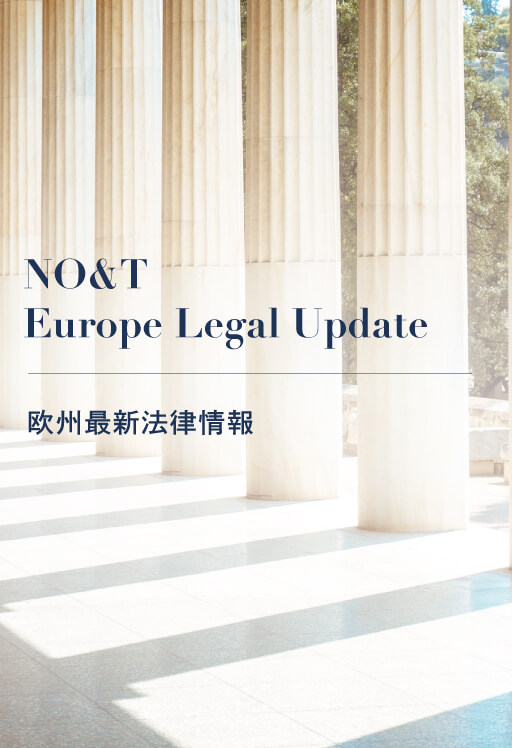

Axel Kuhlmann, Makoto Ohnuma, Shejal Verma, Sofía Terol Cháfer (Uría Menéndez) (Co-author)


Yuan Yao Lee
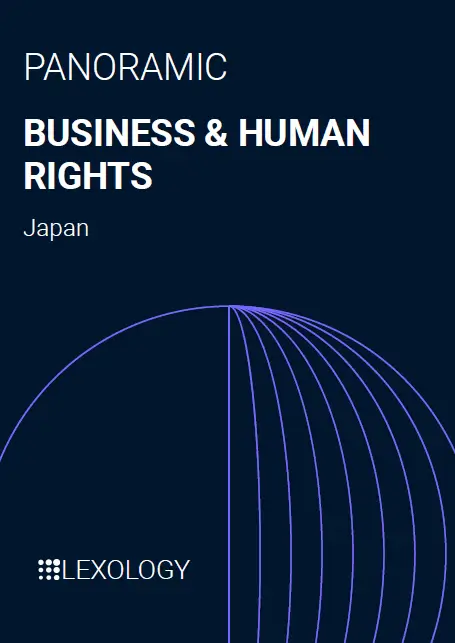

(April 2025)
Ayumi Fukuhara, Momoko Yamashita, Nina Newcombe (Co-author)
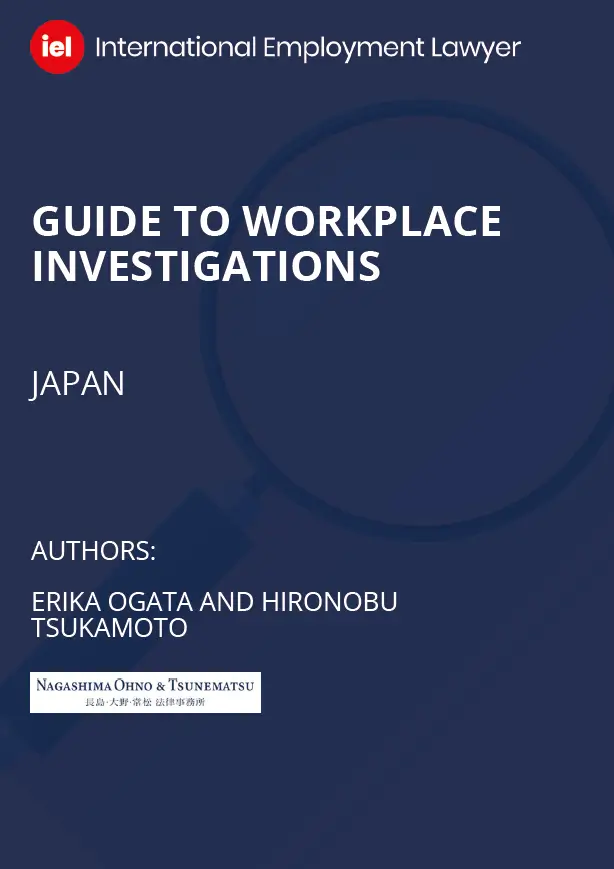

(January 2025)
Hironobu Tsukamoto, Eriko Ogata (Co-author)


Yothin Intaraprasong, Waritpan Titatornwattanasiri, Yanisa Wiboonthan (Co-author)
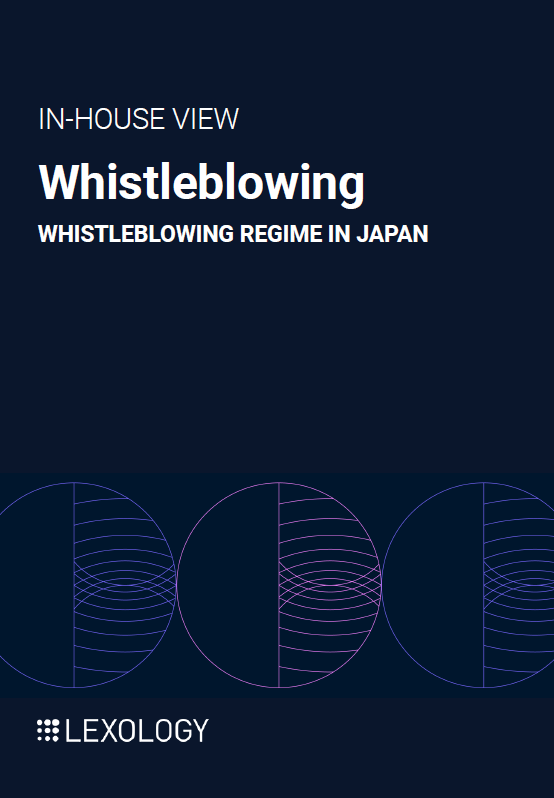

(September 2024)
Daisuke Fukamizu, Kosuke Gunji (Co-author)